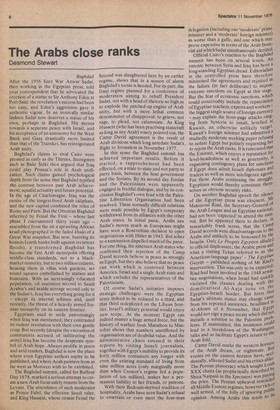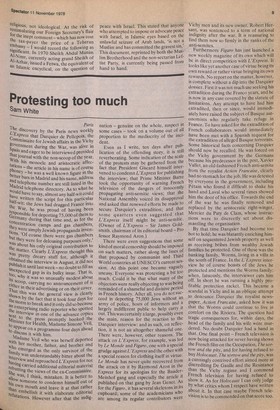The Arabs close ranks
Desmond Stewart
Baghdad After the 1956 Suez War Anwar Sadat, then working in the Egyptian press, told your correspondent that he advocated the erection of a statue to Sir Anthony Eden at Port-Said: the revolution's success had been too easy, and Eden's aggression gave it authentic vigour. In an ironically similar fashion Sadat now deserves a statue of his own, perhaps in Baghdad. His moves towards a separate peace with Israel, and his acceptance of an autonomy for the West Bank and Gaza drastically more limited than that of the Transkei, has reinvigorated Arab unity.
Baghdad's claims to rival Cairo were pressed as early as the Thirties. Strongmen such as Bakr Sidki then argued that Iraq could play Prussia's role in Arab unification. Such claims gained psychological depth from the sense that Baghdad typified the contrast between past Arab achievement, squalid actuality and future potential. In the age of Charlemagne, Iraq was the centre of the longest-lived Arab caliphate, and the new capital combined the roles of Rome and Paris. But the Ottoman Baghdad inherited by Feisal the First — whose last phase I encountered thirty years ago — resembled from the air a sprawling African kraal photographed in the faded khaki of a Great War snapshot. But now, bursting its bounds (earth banks built against recurrent floods), a transformed Baghdad has become the first Arab metropolis offering middle-class standards, not to a blackmarket minority, but to two million citizens, housing them in villas with gardens, set round squares embellished by statues and fountains. With an increasingly .educated population, oil resources second to Saudi Arabia's and arable acreage second only to the Sudan's, Iraq has everything going for it — except its internal schisms and, until recently, the threat of a heavily armed Ira nian monarchy on its eastern frontier.
Egyptians used to smile patronisingly when Iraq was mentioned; they contrasted its violent revolution with their own gentle coup. But recently (despite the execution of communists accused of infiltrating the army) Iraq has become the desperate symbol of Arab hope. Always prolific in poets and avid readers, Baghdad is now the place where even Egyptian authors aspire to be published, and where Arab painters from as far west as Morocco wish to be exhibited.
The Baghdad summit, called for Balfour Day 1978, marked a serious attempt to create a new Arab focus safely remote from the Levant. The attendance of such moderates as Prince Fahd, the effective Saudi ruler, and King Hussein, whose cousin Feisal the Second was slaughtered here by an earlier regime, shows that in a season of alarm Baghdad's tocsin is heeded. For its part, the Iraqi regime planned for a conference of moderation aiming to rebuff President Sadat, not with a head of rhetoric so high as to explode the patched-up engine of Arab unity, but with a more lethal common denominator of disapproval: to grieve, not rage, to plead, not calumniate. As King Hussein (who has been practising statecraft as long as any Arab) wisely pointed out, the Camp David agreement is the result of Arab divisions which long antedate Sadat's, flight to Jerusalem in November 1977.
In this sense the Baghdad summit has achieved important results. Before it started, a rapprochement had been effected, on a state to state and not party to party basis, between the host government and the Syrians. By its second day Jordan and the Palestinians were apparently engaged in fruithil dialogue, and by its conclusion Baghdad's own feud with the Palestine Liberation Organisation had been resolved. These normally difficult relations were made possible by Egypt's temporary withdrawal from its alliances with the other Arab states. In initial panic, Arabs saw Sadat's moves much as Europeans might have seen a Roseveltian decision to open negotiations with Hitler in 1943. But sober re-examination dispelled much of the panic. For one thing, the nineteen Arab states who confirmed their rejection of the Camp David accords believe in peace as strongly as Egypt, but they also believe that no peace can work which is contrived between America, -Israel and a single Arab state and which excludes the representatives of the Palestinians.
Of course Sadat's initiative imposes strategic challenges: were the Egyptian army indeed to be reduced to a third, and that third redeployed on the Libyan frontier, Israel's military potential would enjoy new scope. At the moment Egypt can indeed muster a huge armed force, but the history of warfare from Marathon to Mussolini shows that numbers unstiffened by organisation are of doubtful value. And the administrative chaos stressed in their reports by visiting Israeli journalists, together with Egypt's inability to provide its forty million consumers any longer with even the existing standard of living from nine million acres (only marginally more than when Cromer's regime fed a population of ten million), makes her a per manent liability to her friends, or patrons. With their Bedouin-derived tradition of hospitality, Arabs have seen Sadat's refusal to entertain or even meet the four-man delegation (including one `moderate' prime minister and a 'moderate' foreign minister) as worse than a gaffe, and one which may prove expensive in terms of the Arab financial aid whichSadat simultaneously derided. Official Cairo's reaction to the Baghdad summit has been on several levels. An entente between Syria and Iraq has been a long-standing Egyptian dread. Editorialists in the controlled press have therefore minimised the agreements and rejoiced in the failure (in fact deliberate) to impose extreme sanctions on Egypt at this stage. But the fear of economic sanctions, which could conceivably include the repatriation of Egyptian teachers, experts and workers — the biggest single source of foreign currency — may explain the front-page attacks ranging from hysteria to insult, levelled at Kuwait, an otherwise unlikely target' Kuwait's foreign minister had submitted a studiedly moderate working paper refusing to isolate Egypt but politely requesting her to rejoin the Arab ranks. It is rumoured that the Emirate, which enjoys a reputation for level-headedness as well as generosity, Is organising contingency plans for sanctions if Egypt does admit Israeli diplomats and traders as well as more intelligence agents. For those Arabs continuing the struggle, Egyptians would thereby constitute them" selves as obvious security risks. On another Baghdad speech the silence of the Egyptian press was eloquent. Mr, Mahmoud Riad, the Secretary-General of the Arab League and an Egyptian national, had not been 'expected' to attend the sun:Imit. But he appeared there to declare, In remarkably frank terms, that the Cara David accords were disadvantageous to the Arabs and unlikely to be honoured by the, Israelis: Only Le Pro gres Egyptien allude° to official displeasure; the Arabic press and what a visiting Texan referred to as the American-language paper' — The EgyPt1a,r1 Gazette — published nothing of Mr Riad s. intervention. This was only to be expecte.d. Riad had been involved in the 1948 armistice negotiations, when Israel had quick violated the clauses dealing with the demilitarised Al-Auja zone on the Egyptian-Israeli border. But hints that Sadat's ultimate stance may change caMe from his reported insistence, headlined 10 Al-Ahram of 6 November, that EgY0 would not sign a peace treaty which did not include a solution to the Palestine Pr°b_, lems. If maintained, this insistence coulo lead to a breakdown of the Washington talks and so facilitate Egypt's return to the Arab fold. Camp David marks the western horlIptit of the Arab dream, or nightmare. On._ events on the eastern horizon have, ac'i dentally, affected Sadat and his critics alike.. The Persian plutocracy which sought Loots XXX chairs (as prophetically described.bY Shiva Naipaul in the Spectator) was pal the price. The Persian upheaval reminde all Middle Eastern regimes, however rich well armed, of the folly of ignoring Public opinion. Among Arabs this tends to he religious, not ideological. At the risk of restimulating our Foreign Secretary's flair for the inept comment — which has now cost the tax-payer the price of a Teheran embassy — I would record the following as significant. In 1970 Sheikh Abdul Muni currently acting grand Sheikh of Al-Azhar, issued a Fetwa, the equivalent of an Islamic encyclical, on the question of peace with Israel. This stated that anyone who attempted to impose or advocate peace with Israel, in Islamic eyes based on the unlawful seizure of Arab lands, 'is not a Muslim and has committed the gravest sin.' This document, reprinted by both the Muslim Brotherhood and the non-sectarian Leftist Party, is currently being passed from hand to hand.



































 Previous page
Previous page